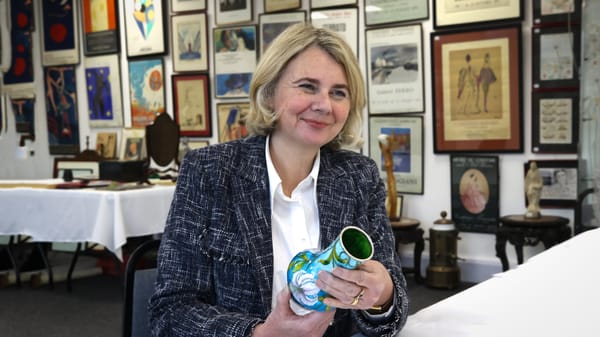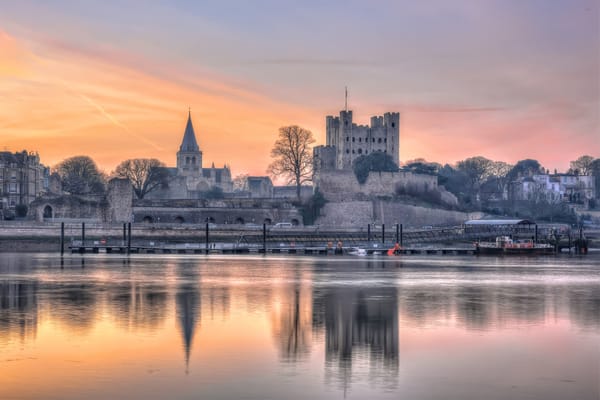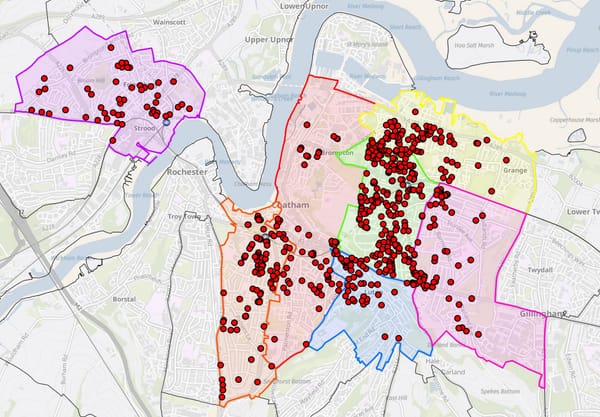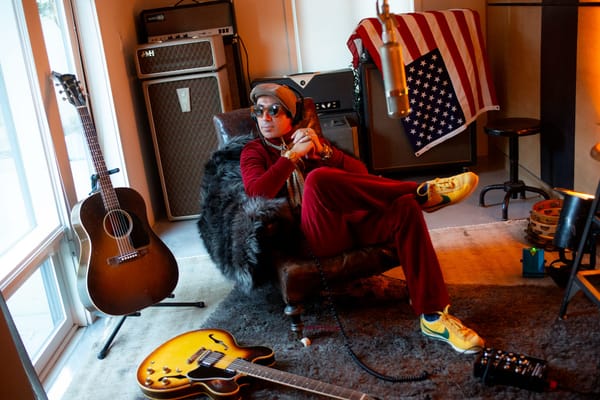"I can understand why people don't want party politics and policing to mix"
What Steven asked Matthew Scott, Kent's Police and Crime Commissioner
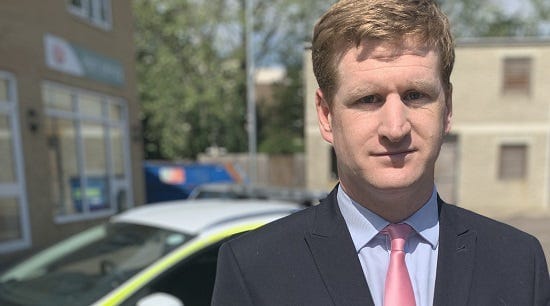
For the latest Sunday interview, Steven sat down with Kent’s Police and Crime Commissioner, Matthew Scott at Medway Police Station. Matthew was elected to the role in 2016 and is currently serving his second term. They discussed the balance of the role with party politics, the effects of austerity and council precepts on police budgets, and the level of crime in Medway.

Where were you born?
I was actually born in Westminster (Hospital). That used to exist opposite St Thomas’ Hospital. Very quickly after that, we moved as a family out to Sidcup where I grew up I went to school and was a councillor in the London borough of Bexley, before I moved out into Kent, met my wife, and married and set up home here.
What jobs did your parents do growing up?
My father was a police officer. He served as a temporary Chief Inspector in his last role in the Metropolitan Police. He retired in 2011 and then went back in. He took some time off after he retired and then went back in to work in their control centre. So he's seen policing from both the police officer and the police staff side, so it's a big part of my life growing up.
My mother worked for the police as well. She’d done other roles, but she worked in the Metropolitan Police as a member of police staff in their vehicle section. It’s a very policing-heavy family that I come from.
How did you find school and university?
I went to Beths Grammar School just on the borders of Kent and Bexley. I think back over what I ended up studying and look now and think I should have maybe taken a slightly different course because I really excelled at languages and mathematics. How I ended up with politics and business was, I think, a mystery to some of my teachers. From there, went off to Birmingham where I studied more practical politics. I didn't want to just do the raw ideologies as it were. I did a public policy degree so it was about policy making, management, social policy and things like that and graduated in 2005.
What was your first full-time job?
I worked for David Evennett who was the MP for Bexleyheath and Crayford. He's still there in Parliament now, about to celebrate his 40th anniversary of his first election. That was a really interesting experience and it's a lot. It is a role that some people do often straight out of university or very early on in their political careers, but actually, I learned a lot of really good practical things about the way that Whitehall works and the way that Westminster works. Obviously doing a lot of research and speech writing and things like that, but a lot more of the ministerial liaison work, working with different government departments on his behalf, where there may be select committees or legislation committees or things going on in parliament actually helping him being that conduit when he was a government whip. It's been very helpful when I've been trying to make Kent's case for either a legislative change or some finances. I know which doors to knock on repeatedly until they open.
When did your name first appear on a ballot?
Politically, 2006. I stood as a Conservative candidate for St. Michael’s Ward. It’s been merged with another ward as part of boundary changes now. I stood down in 2010. I was a bit of a sucker for punishment in terms of elections. I stood first in student union elections whilst I was in university as well but was not successful.
What is your official occupation?
Police and Crime Commissioner, full time.
What does the average day entail?
Going to give you a cliché, there is no average day. I think that the role is so varied that there are many things. So today for example it could be chairing and involves a lot of meetings. If there's one consistent thing about this role is there are a lot of meetings and rightly so if we are to have effective scrutiny, if we want things to go well. So, it could be anything from a performance meeting with the Chief Constable. I meet him every week, every Monday. Monday is probably my only consistent day, where it's my meeting with my Chief Executive and Chief Finance Officer about our office activities. There is a lot of consistency around the early part of the week, but it could be anything from meeting with other PCC colleagues, going out to visit charities and things like that, so it's very very intense from a meeting perspective. But my focus does try to be towards the end of the week, much like MPs do, having constituency-style days. As much as I don't mind a spreadsheet, I'm not stuck in them all week. I'm not stuck in meetings all week, the biggest part of this role is engaging with the public and that's why I tried to do more with meetings and visits later in the week.
Representing an area as wide as Kent, is there a balance between which parts of Kent you are in more than others, or are there areas you wish you could get to more than you do?
I try to take the opposite approach, I know where my headquarters are, so I try and get away from it. My office has always been based in Maidstone, so obviously there's a natural inclination between Maidstone and north Kent police stations. I know where I'm going to be for the rest of the week let's see what we can do elsewhere and go out to evening events with different community groups dotted all over the county. So my main focus is trying to get out of headquarters and getting out and about rather than it being a natural pull.
How do you balance being apolitical in an elected role as a member of the Conservative Party?
I can understand why people don't want party politics and policing to mix and I think it's important to recognise the fact that we do have a very clear divide between the PCC, the politician, and the Chief Constable, the police officer. I might have very strong opinions about where resources should go, but that is the gift of the Chief Constable. The key to that is making sure that your relationship is such that you can discuss these issues. You can make sure you're holding the Chief Constable to account, you're setting the priorities adequately and that they respond in the most appropriate way.
Our neighbourhood policing model is a really good example, the one that will start in the next couple of months, where I raised some concerns about the model which was being proposed, about how visible the force would actually be as a result of that and with all due credit to the Chief Constable, he had another look at it and they made some changes and what we've got coming is really good. In a more political world, it would have been simpler for the Conservative or Labour PCC to go ‘Well, that's where I want resources’ as that's where it benefits me. I never operate like that. I'll go out and campaign at election time for Conservative colleagues. I always have done, but the key is not getting your office caught up in that.
My team don't have anything to do with political invitations, political campaigning, or political engagement. Everything my team does is basically like the civil service. I don't have anyone in my office who is party political. The only person I could appoint party political would be a deputy, and I don't have one. It's really important that people can have faith and confidence that decisions are being made for the right reasons, and will still make their case. I will have my manifestos and the things that I want to do, but it's important we don't allow party politics and policing to mix in that way. On the other hand, though, with my now seven years of experience working policing, Chief Constables are quite political themselves in the way that they have been known to go about things and lobby for things, so we're not the only culprits when it comes to politics and policing.
Almost as many people voted for you in 2021 as voted in total in 2016. What’s your explanation for the increase?
I think there's a couple of things. I think we have to be honest about the fact that we had Kent County Council elections and other elections on the same day, which did boost turnout. I would have liked the government to continue that going forward because I think it makes sense from a logistical point of view, that we have these elections on the same day. But I want to carry on trying to boost the turnout and it's incumbent upon us as PCCs and also the Home Office, as our sort of sponsors of the PCC project, to try and do that. I hope that we have a higher turnout next year, but in terms of the personal vote, I was really lucky. I felt tremendously privileged to have not needed a second round of voting last time, getting over 50%.
Why is having an elected leader of Kent Police a good thing?
I think it gives the public a better say over policing in their area. I think what we had before with the police authorities was perfectly fine in terms of scrutiny, but it didn't have any agility to deal with real issues that the public faces. So, we can as PCCs, on a day-to-day basis, affect change in our local areas. We can set priorities for our police forces, hold our Chief Constables to account, we can be involved in briefings and decision-making in a much more rapid basis. Whereas a more committee style-based structure like we have in local government doesn't really give you that same level of responsiveness and also you are bound by collective responsibility. But now what you've got is somebody who is directly responsible to you as a taxpaying resident. Someone who is directly responsible for spending your money. There's no such thing as government money, it's your money. I'm more accessible than authority was and frankly, whilst I wouldn't recommend it, people can vote me out if they want to.
According to the Indices of Deprivation, Medway fares worst for crime. Why are residents at such high risk?
There are multiple factors. From a policing focus, we have put a greater level of resource in Medway compared to Kent. There is unemployment, mental health, drug addiction. The links to London because we see a lot of people placed in Medway from out of the area as well. I don't think Medway is a bad place to live. It's always been a great place to visit.
Is a resident of Medway at a greater risk of crime than someone living in the rest of Kent?
Statistically yes, Medway does have a higher crime rate than other parts of Kent. Absolutely transparent about that, but the important thing is what we're doing about that. We've put more police officers into Medway. We've established a Medway Task Force with other agencies to try get to the root causes of those problems. Not just an enforcement response, which is important, but prevention and engagement as well. Our neighbourhood policing models will see a greater number of resources coming into Medway, to do the local beat-based roles in their town centres, but also in more rural and isolated parts of Medway as well, not just the town centres. You've got the Hoo Peninsula as well, some rural villages often do feel isolated, so we are responding to that by putting more resources into Medway. We have seen some results in the last year, a 5% reduction in crime in Medway. Some of the significant issues which affect people, particularly violent crimes dropped in the last year and also seen drops in burglary last year as well. So, you are right to point out that statistically it is higher, but that doesn’t mean that we are ignoring supporting the community.
What was your involvement in the Click B4 U Call campaign, that resulted in a Kent Police poster that listed rape as a ‘non-emergency’?
No, I wasn't directly involved in that campaign, but I was involved in holding the force to account subsequently for that. It was a really regrettable incident. It's not my view, never been my view, and it's not the view of the Chief Constable. Quite rightly it was taken down and they did do a search to make sure there weren't others up and make sure that any non-official posters were removed, and they put up more consistent things.
Rape is one of the most serious crimes that anyone can be a victim of. It has a tremendously harmful effect on people, and I've said publicly before that I'm sorry that it happened. The force has apologised for it as well. It was never their intention to say to people that rape and sexual offences and domestic abuse are not an emergency, because they are. It was a really clumsy piece of communication. I've been doing, as I say, a lot of scrutiny and holding to account and as a result, my next performance and delivery board, will be bringing a paper to me directly on public contact. My own team have been doing mystery shopper exercises at front counters as well, just to make sure that the force has done clean sweeps of their police stations, to make sure that they are they're not finding any more of these posters. I'm sorry, I really am. It's not defendable in any way, but I think they have learned a really important lesson from this, and it should not happen again.
According to HM Inspectorate of Constabulary, Kent Police is outstanding at recording data and less than adequate at investigating crime. Why is this?
We've had some challenges with regards to crime investigation, it's absolutely true, we have a very young in-service workforce, where we obviously saw a reduction in place officers. So, with both the recruitment that I did in my first three years and in the subsequent three years, not only have we recruited 1,000 more police officers, but we’ve also had to recruit probably just as many again to maintain them. So, you have a tremendously young in-service workforce dealing with very complex issues. It identified some issues around training, supervision, and around caseloads. The effect of that was basically because they were recording it better than any other police force, it was generating a lot more work, but there wasn't the capacity or the supervision to deal with it. Crime investigations are improving, charge rates are improving, solved rates are improving as well, but I think it was a trend across all of policing as well. People don't care about accounting rules, they just want action on their crimes. So, what you actually saw is policing is getting really good at recording things but because they were recording so much, they weren't they didn't have the capacity to investigate all of those things either and that's where they were really struggling. I think with some reforms which have happened, this investment we put into supporting those officers with investigations should yield benefits when the next inspection takes place. We acknowledge that it wasn't up to scratch, and there's still some way to go, we will be honest about that, but it is improving.
Instead of a council tax precept, shouldn’t all funding for the police come from the Home Office?
It's a really interesting point. It's a significant amount of money and we will always quibble about the source of where it comes from. I think there should be a locally based element to it because local decision-making should be reflected in there and how the money is spent. What we probably need is a fairer system of that distribution, because despite being the sixth largest force, we're in the bottom 10 for funding by head of population.
You’ve mentioned before about how we have a relatively low council tax precept. Should that be raised to help investigate crime?
I'll be honest about my record on council tax. I’ve tried to keep it as low as possible, but the financial challenges for policing have meant that I've had to use the flexibility to raise more money from council tax. So, council taxes are higher. It was about £153 when I was elected, it's over £243 now because we've needed that investment in order to support local policing, in order to recruit those extra police officers, to maintain the service levels. So, I have used council tax to invest in policing but also to sustain the policing. Without that investment, we would have been going backwards again. We still have some financial challenges ahead and council tax will continue to be part of that solution. I also say that the funding itself needs to be fair, because for a force of our size, right next to London, right next to the continent, which has significant cross-border issues that we deal with on a day-to-day basis, as well as our own demand, we're dealing with London scale challenges in some places without London's level of funding.
What additional roles, paid or unpaid, do you do?
I'm a member of the Kent and Medway Fire Authority, which is unpaid. I'm also Chair of the board of Blue Light Commercial, which is another unpaid role for a national procurement policing project. I'm also a trustee of the Road Safety Trust, which is again unpaid.
Some areas have a Police, Fire and Crime Commissioner. Should you be given responsibility for fire services as well?
I've decided not to do that. It was something the Home Office decided they wanted PCCs to bid for. I think we've only got five or six who have chosen to do it, but I decided not to, for a couple of reasons. One is because the process of actually doing it I think would have been a distraction, but also I put on record the fact that the team at Kent Fire do a really good job, I didn't feel the need to expand an empire and intervene for sake of doing so and spend all that time trying to do it. I felt that the focus needed to be on police and we're starting to see good results as a result of that. If they mandate, then fine, I will happily do it. I've got a great working relationship with the team at Kent Fire and Rescue, I am already a member of the authority, they've allowed me onto the board as a member to do that, which is a good sign of our collaboration.
Why haven’t we had an ITV drama series about a Police and Crime Commissioner?
Actually, the PCCs were talking about this the other day, because apparently there's one in Succession. Dennis the PCC turns up randomly at an event. There's a PCC in Line of Duty, who resigns on a point of principle which was nice to see, and then there was one I think there's that TV show with Rob Lowe (Wild Bill), where he hires the police chief to come in from America and the PCC turns up in his Jaguar or his Bentley to pick him up, which is a massive misrepresentation for the type of cars we drive. You’re right, we haven’t seen a PCC in a lead role. I’ll start writing one.
I understand you used to play in a cover band, what instruments do you play?
I ended up playing all of them at one point. It started at university as a project with some friends from home who I worked with. I started out on bass, bought my first bass guitar after having self-taught guitar whilst I was at university I then had a stint on the drums. Again, taught myself the drums. We don't talk about that period as much because I was nowhere near as good, but I did actually have some lessons in order to make it tolerable. I had periods on guitar and also as lead singer as well for periods. I draw a lot from music whether it's for relaxation or whether it's for running or just letting off some energy when I'm driving between meetings. I'll stick on some AC/DC or something like that or if I'm feeling a bit more musical, I have to be honest and say that I'm a fan of both eras of Genesis. I was listening to the Visible Touch album on the way here actually this morning, but Selling Them By The Pound is actually one of my favourite ones.
Did you support the austerity programme and its effect on the police force?
I think that they had to do something in 2010 given the state of the country's finances and also the global economic situation as well. The two go hand in hand, in what they inherited and also what was going on nationally. I wouldn't have done it in that way, I'm honest about that, because when you consider the amount of government budget which was cut from policing compared to the rest of the total spend, I think they could have found it from somewhere else to maintain that number. But that said, I inherited 600 fewer officers, we've now got those numbers back, we've now got 400 more than we had in 2010, so we turned it around. It was regrettable, I have always been on the record saying it was regrettable.
Should 16-year-olds be able to vote in PCC elections?
Not really given much thought to extending the franchise. One of the things about electoral reform is that people who espouse different views on electoral reform from a political perspective, usually espouse those ones that benefit them the most. I don't have a view, to be honest. In fairness, I'm not ideologically opposed to extending the franchise to younger people. In fact, I think we could trust them more. I think when you go around 6th forms and colleges you meet a lot of very bright young people, who have got very firm views on the world. I don't think we should ever be worried about extending the franchise.
Who has been the best Prime Minister of your lifetime?
This is a really interesting one. I think up until his exit over the EU referendum, David Cameron will be one of the underrated ones actually. He did a tremendous job in very difficult circumstances after 2010. Being very young at the time I don't remember very much of Margaret Thatcher's time as Prime Minister, but obviously, she would have to be part of the conversation given the reforms that she made around tax and businesses and home ownership and shareholdings and things like that.
In your time as PCC, who has been the best Home Secretary?
That’s interesting. There's been a few. We’ve had five different Home Secretaries, four different people. Each of them has had their merits. I think Sajid Javid was very good to work with. He got it. His brother is a police officer, so I think he came into it with some advanced knowledge, and that's not to say that Suella (Braverman) isn't good to work with as well. I think that having seen her in action, when Suella is really focused on what she is trying to deliver, she is really good and tremendous at the detail and scrutinising the work. Challenging and supporting as well. Some of the work I have seen her do behind the scenes has been really supportive of PCCs as well.
Post PCC, would you stand for Parliament?
Wow. Not going to lie, it has always been an ambition to stand for Parliament, but actually, I found over the last seven years, this is a tremendous role I don't want to give up anytime soon. So never say never, but the cliched answer is I'm really focused on this because I do want to get elected next year and maybe again after that. We don't know, that's not my gift, but I'm focused. I really am focused on wanting to carry this on, because I believe in it so much.
Footnotes
Steven Keevil co-founded The Political Medway and still manages to watch hundreds of films a year. He recommends Matinee. Steven listened to no music whilst writing this, but recommends reading Talk to Me by Dean Nelson

